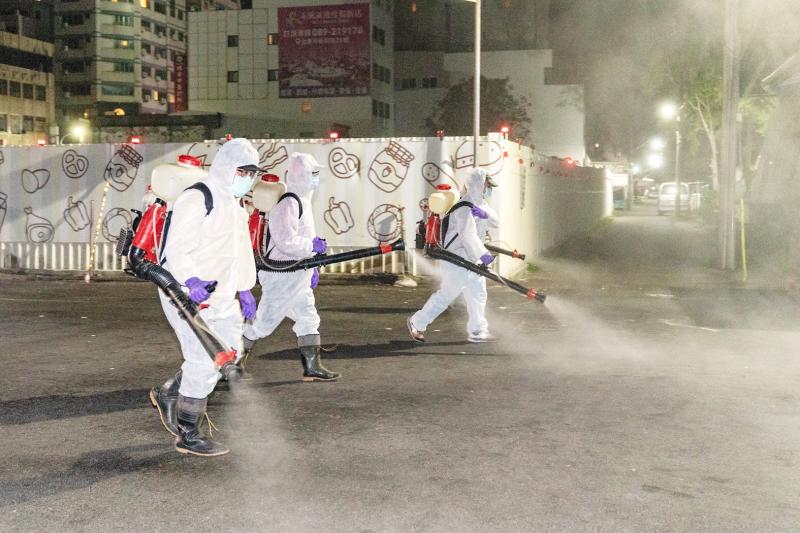Popular tourist spots and transportation hubs nationwide were disinfected yesterday to prevent a spike of COVID-19 cases following the Tomb Sweeping Day long weekend, the Environmental Protection Administration (EPA) said.
Environmental protection departments in cities and counties dispatched special squads, made up of 731 employees, who disinfected 863 locations, including 205 transportation hubs and 250 business areas, the EPA said.
These included popular tourist spots that the Central Epidemic Command Center (CECC) had cited in its text messages on Saturday, when it reminded the public to avoid crowded places and keep a proper social distance, including Kenting (墾丁) and Hengchun Old Street (恆春老街) in Pingtung County, Dongdamen Night Market (東大門夜市) in Hualien County and Guanzihling (關子嶺) in Tainan, it said.

Photo copied by Chen Hsien-yi, Taipei Times
The EPA reminded business owners that they should be following its disinfection guidelines and clean their indoor areas at least once per day, or more if their businesses get a lot of foot traffic.
The guidelines state that items that are frequently touched, such as service counters, tables and chairs, elevator buttons, escalator handrails, shopping carts, doorknobs, water taps, toilet seats and flush handles, diaper-changing tables and floor surfaces, should get special attention.
Minister of Health and Welfare Chen Shih-chung (陳時中), who heads the CECC, yesterday reminded the public to practice good personal hygiene and self-health monitoring following the long weekend.
The center said that it would be reviewing the crowds seen at some tourist spots over the holiday weekend to see if further crowd control measures should be imposed during the Workers’ Day long weekend from May 1 to May 3.
These could include designating more car-free zones to help widen the social distance space for pedestrians and limiting the number of guests that hotels could accept, it said.
Crowded areas were also on the mind of New Taipei City Mayor Hou You-yi (侯友宜) yesterday.
At a meeting about New Taipei City’s COVID-19 prevention measures, Hou said seeing scenic areas packed with holidaymakers had saddened him, as “all the hard work during the disease prevention period would mean nothing as long as there are loopholes.”
Local governments must be fully prepared to roll out more preventive measures, including tourist number controls, crowd diversion, and restrictions on hotel bookings, to perhaps 70 or 80 percent of their original thresholds.
Effective today, anyone not wearing mask would be barred from entering New Taipei City government buildings, including officials, Hou said.
Additional reporting by Chien Hui-ju and Lee I-chia

NATIONAL SECURITY THREAT: An official said that Guan Guan’s comments had gone beyond the threshold of free speech, as she advocated for the destruction of the ROC China-born media influencer Guan Guan’s (關關) residency permit has been revoked for repeatedly posting pro-China content that threatens national security, the National Immigration Agency said yesterday. Guan Guan has said many controversial things in her videos posted to Douyin (抖音), including “the red flag will soon be painted all over Taiwan” and “Taiwan is an inseparable part of China,” while expressing hope for expedited “reunification.” The agency received multiple reports alleging that Guan Guan had advocated for armed reunification last year. After investigating, the agency last month issued a notice requiring her to appear and account for her actions. Guan Guan appeared as required,

Japan and the Philippines yesterday signed a defense pact that would allow the tax-free provision of ammunition, fuel, food and other necessities when their forces stage joint training to boost deterrence against China’s growing aggression in the region and to bolster their preparation for natural disasters. Japan has faced increasing political, trade and security tensions with China, which was angered by Japanese Prime Minister Sanae Takaichi’s remark that a Chinese attack on Taiwan would be a survival-threatening situation for Japan, triggering a military response. Japan and the Philippines have also had separate territorial conflicts with Beijing in the East and South China

A strong cold air mass is expected to arrive tonight, bringing a change in weather and a drop in temperature, the Central Weather Administration (CWA) said. The coldest time would be early on Thursday morning, with temperatures in some areas dipping as low as 8°C, it said. Daytime highs yesterday were 22°C to 24°C in northern and eastern Taiwan, and about 25°C to 28°C in the central and southern regions, it said. However, nighttime lows would dip to about 15°C to 16°C in central and northern Taiwan as well as the northeast, and 17°C to 19°C elsewhere, it said. Tropical Storm Nokaen, currently

PAPERS, PLEASE: The gang exploited the high value of the passports, selling them at inflated prices to Chinese buyers, who would treat them as ‘invisibility cloaks’ The Yilan District Court has handed four members of a syndicate prison terms ranging from one year and two months to two years and two months for their involvement in a scheme to purchase Taiwanese passports and resell them abroad at a massive markup. A Chinese human smuggling syndicate purchased Taiwanese passports through local criminal networks, exploiting the passports’ visa-free travel privileges to turn a profit of more than 20 times the original price, the court said. Such criminal organizations enable people to impersonate Taiwanese when entering and exiting Taiwan and other countries, undermining social order and the credibility of the nation’s